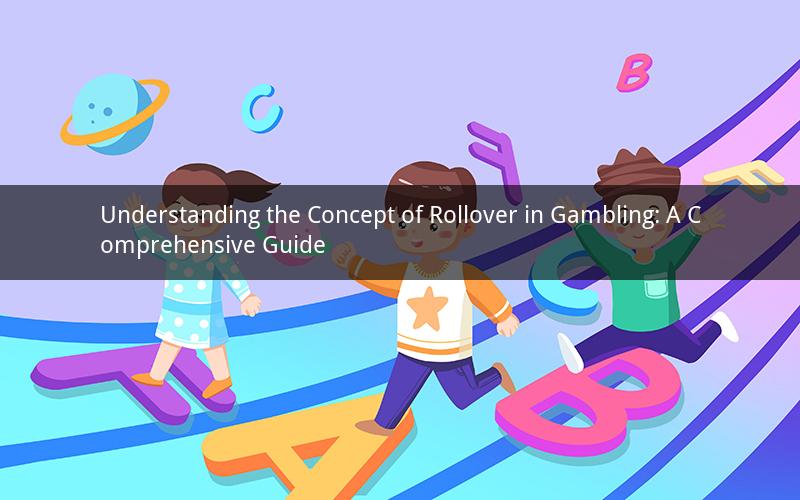
Rollover, in the context of gambling, refers to a condition where a player is required to wager a certain amount of money a certain number of times before they can withdraw any winnings. This term is commonly used in online casinos, sports betting, and poker rooms. In this article, we will delve into the intricacies of rollover in gambling, its implications, and how it affects players' experience.
1. What is a rollover?
A rollover, also known as a playthrough requirement or wagering requirement, is a condition set by online gambling platforms that players must comply with before they can withdraw their winnings. The rollover is calculated based on the bonus amount or the deposit amount, depending on the promotion.
2. How does rollover work?
When a player claims a bonus, they are usually required to meet the rollover requirement by playing a certain amount of money. For example, if a player receives a $100 bonus with a 20x rollover, they must wager $2,000 ($100 x 20) before they can cash out their winnings.
3. Types of rollover
There are two main types of rollover: cash rollover and non-cash rollover.
- Cash rollover: This is the most common type of rollover, where players must wager a certain amount of cash before they can withdraw their winnings.
- Non-cash rollover: This type of rollover requires players to play a certain amount of money, but the winnings from the bonus cannot be withdrawn. Instead, they can only be used for further betting.
4. The impact of rollover on players
Rollover has a significant impact on players, both positively and negatively.
Positive aspects:
- Enhanced betting experience: Some players view rollover as a challenge that adds excitement to their gambling experience. It encourages them to play more and potentially win more.
- Increased winnings: Rollover gives players the opportunity to win more money than they initially deposited.
Negative aspects:
- Frustration: Rollover can be frustrating for players who have met the requirements but are unable to withdraw their winnings due to other conditions, such as maximum withdrawal limits.
- Reduced value of bonuses: The higher the rollover, the less value the bonus has for players.
5. Tips for managing rollover
Here are some tips to help players manage rollover more effectively:
- Choose bonuses with reasonable rollover requirements: Opt for bonuses with lower rollover rates, as they are more likely to be met.
- Set a budget: Determine a budget for your gambling activities and stick to it, even when faced with rollover requirements.
- Focus on games with higher odds: Choose games with higher odds of winning to meet rollover requirements faster.
- Avoid playing for too long: The longer you play, the higher your chances of losing your money. Set a timer to remind yourself to take a break.
- Read the terms and conditions: Make sure you understand the rollover requirements before accepting a bonus.
Frequently Asked Questions (FAQs) about Rollover in Gambling:
1. Question: Can I withdraw my winnings before meeting the rollover requirement?
Answer: No, you cannot withdraw your winnings until you have met the rollover requirement set by the gambling platform.
2. Question: What happens if I do not meet the rollover requirement?
Answer: If you do not meet the rollover requirement, you may lose the bonus amount and any winnings derived from it.
3. Question: Can I use the bonus on any game to meet the rollover requirement?
Answer: It depends on the terms and conditions of the bonus. Some bonuses may only be applicable on specific games, while others may be available for all games.
4. Question: Can I cancel my bonus if I'm not comfortable with the rollover requirement?
Answer: Yes, you can cancel your bonus at any time. However, you may lose any winnings derived from the bonus.
5. Question: How long do I have to meet the rollover requirement?
Answer: The time frame for meeting the rollover requirement varies depending on the gambling platform. Make sure to read the terms and conditions to know the deadline for meeting the rollover requirement.